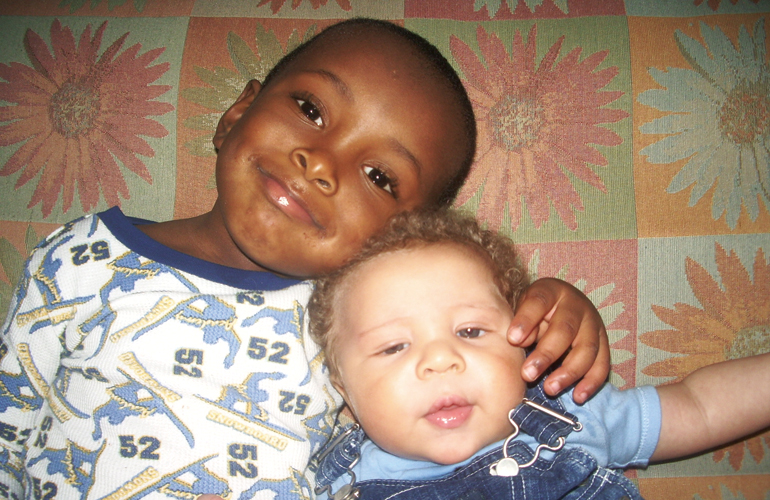Sam was 36-hours-old when his birth mother placed him in my arms. She chose me after an unusually short wait — I received the bundle swaddled in a hospital-issue blue and pink baby blanket just three months after I turned in my paperwork. She spoke of her wishes for him, and asked me to remind him every day that she loved him. We promised to stay in touch. We hugged each other hard and awkwardly, and then she was gone.
Sam and I were suddenly alone in a hospital room with a handful of diapers and some red roses in a vase roughly constructed from the bottom half of a plastic soda bottle. Then a nurse came in and gave me a wristband that identified me as the mother of this child.
During my first months of adoptive motherhood, in the precious hours between feedings, I often lay awake wondering, Am I feeling the way I am supposed to feel when I see his little fingers gripping mine? Or would it land closer to the core of my maternal cells if his fingers looked a little more like my own? When I drank in that intoxicating, long-awaited baby smell from his new peach-brown skin, did the intoxication take a detour because his smell did not trigger a memory?
Were my feelings, as an adoptive mother, the same as a biological mother’s? This question ate away at my tenuous new-mama center, and I worried that this need for reassurance would haunt me all our lives. And what if I discovered what I feared to be true — would our bond be labeled “adequate” or “nearly as intense”?
The Mama I Was Meant to Be
When Sam was two years and nine months old, I gave birth to his brother, Marcel. This happened more quickly than I had planned. When I decided to try donor-assisted insemination, the doctors told me it would take about a year of trying. Doctors are not always right. I hit the conception jackpot on the first try.
I hated being pregnant. Miracle aside, I was terrified. I was a single mother, approaching 40, and this was hard. My labor was grueling and, after more than 36 hours, ended in an emergency C-section. Marcel was fine. I barely recognized myself, emotionally or physically, as I lay there, stitched up, with a newborn in my arms. When Marcel started nursing, I recoiled in horror. Does he have to do that? I wanted to flee. I wanted my body back. I missed Sam.
I’d long ago forgotten my intense concern about whether my feelings for Sam were as legitimate as another mother’s for her child. Sometime around Marcel’s second day of life, as I held his perfect little body against mine, grief for Sam’s birth mother came crashing over me. I wept, wondering how she’d found the strength and courage. When she placed that child in my arms, she must have felt as though she were giving birth a second time.
The mama I became the moment my first child was entrusted to me is the mama I would have become no matter what, though it took giving birth to Marcel to realize that. The baby himself made me a mother, not the cell tissue he was made of. Joy is not uterine-dependent.
Without Question
Now, as a mother through birth and a mother through adoption, I find myself the recipient of email after email from friends of friends who are exploring adoption. Ever so carefully, each one asks: “Do you feel any different about one or the other?” They want to know if they will love an adopted child as much as they would love a biological child.
Adoption is its own gestation, I sometimes respond. When I decided to adopt, I filled out hundreds of forms, and sat through hours of interviews, to prove my readiness to parent. The wait, whether for a birth family to choose you or for a referral, brings a physical and emotional shift in your heart and body. When the wait ends, and your preparation begins in earnest, you enter a final trimester of hope and terror. When you deliver, just as when you adopt, the placement of a healthy child into your arms is not a certainty until that baby is there with you, breathing quickly, and with a softness so precious you think it can’t possibly be real.
Those mamas whose pregnant bellies I envied, whose baby showers I sat through in silent rage, had nothing over me in the feelings department. I did the research the hard way, and the fact that one of my sons looks like me from a certain angle in the right light does not make him any more my child.
There is no difference in the way I run to one when he bumps his thick head, or crumple when the other tells me that someone hurt his feelings. I felt the same joy when each of my baby boys smiled at me for the first time. When Sam kicks a ball harder than the imp who picked on him in line, I explode with pride. When Marcel sees a picture of Darth Vader and starts humming the Star Wars theme song, I delight in his brilliance.
My boys have completely different, irreverent temperaments, so I respond to each child in a different way. But as far as how I love them, it is the same.



